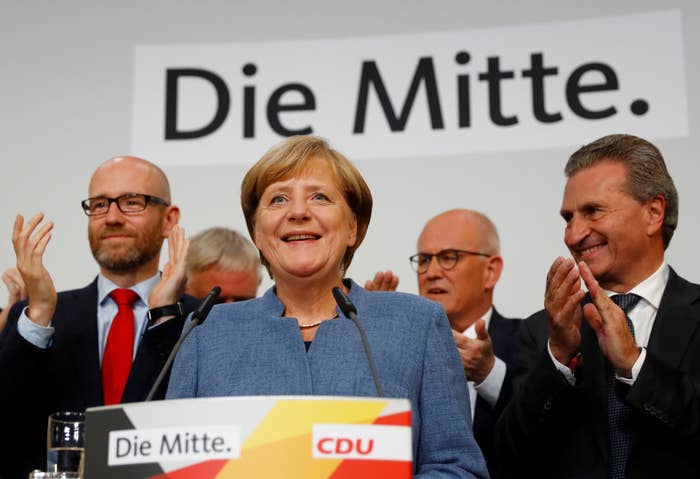
Angela Merkel has won a fourth consecutive election in Germany — a feat to match Helmut Kohl, the father of German reunification — while a far-right party also won enough votes to enter parliament.
Merkel’s Christian Democratic Union (CDU) and its Bavarian sister party the Christian Social Union (CSU) are on course to win about 33% of the vote, according to provisional results.
The result would be the lowest for the party under Merkel’s leadership, down 8.5 points compared to 2013. But it is not too dissimilar from her earlier victories in 2005 and 2009.
Speaking to CDU supporters shortly after the initial figures were published, Merkel acknowledged that she would have liked to do better. But the CDU had achieved its goal of coming first, she said: "We mustn’t forget – looking back at an extraordinary challenge – that we nevertheless achieved our strategic objectives: We are the strongest party. We have a mandate to form the new government and we will form the new government."
“Later tonight we will celebrate, and then we will get down to work,” Merkel concluded.
The Social Democratic Party (SPD) of Merkel’s main opponent Martin Schulz is expected to win 20.5%: the party’s worst ever result.
The election will also see the Alternative for Germany (AfD) party become the first far-right party to enter Germany’s parliament in 65 years – and with seats will come financial resources and greater visibility.
The AfD is projected to become the third-largest party in Germany with 12.5% of the vote. Should the next government end up being a continuation of the current CDU/CSU–SPD grand coalition, the far right will be the main force of opposition in parliament.
The other parties above the 5% threshold needed to enter parliament are the liberal FDP, the Greens, and the hard-left Die Linke (The Left).
Vorläufiges Ergebnis #btw17: Wahlbet. 76,2% CDU/CSU 32,9% SPD 20,5% AfD 12,6% FDP 10,7% LINKE 9,2% GRÜNE 8,9% And 5,0% CDU 26,8% CSU 6,2%
The AfD has been mired in controversy: nationalist rhetoric and themes of the past have resurfaced, candidates’ social media profiles reveal evidence of far-right extremism, and the party has shifted its focus from Europe’s financial crisis to immigration and identity. It ran a campaign based mostly on an anti-migrant and Islamophobic platform. Still, according to the projections, the AfD has more than doubled its support since 2013.
Turnout is projected at 76.2%, an increase of 4.7 points compared to 2013.
While Merkel looks to have comfortably won the election, coalitions are the rule in Germany and governments are an alliance of multiple parties. From how to reform the European Union to where to focus investment at home, the question of who will govern Europe’s most powerful economy alongside Merkel is one of great consequence.
The bigger picture is clear, but it will be weeks of haggling before a new government is in place. The country’s next parliament will look rather different to the outgoing one. The combined force of the two largest parties is set to drop to a postwar low. There will be more parties in parliament than ever before, and the overall composition of parliament will tilt to the right.
During the traditional televised leaders' discussion on Sunday evening, Merkel said that in terms of numbers, "there are two options to forming a coalition," and appealed for responsibility.
However, the Social Democrats will be weary of another term in coalition with Merkel, and Schulz ruled one out after initial projections were released, and again during the televised discussion.
In the pot of parties that could end up in government, there are the Greens and the liberal FDP. Should the SPD continue to rule out another grand coalition, Merkel will look to both to form a government.
After losing all its seats in 2013, the FDP has returned to parliament. Much of the liberal revival has been built on the fresh and digital savvy image of party leader Christian Lindner, which has helped the party’s pro-business message to cut through.
Under Lindner’s leadership, the FDP, which would normally be considered the CDU/CSU’s natural ally, has shifted to the right in order to differentiate itself from Merkel’s party. It has landed on a more hawkish economic position, especially on eurozone integration, compared to Merkel’s, while hinting at a more dovish one in regards to relations with Russia and its annexation of Crimea.
Those close to Merkel suggest she would have preferred a coalition with the Greens. Earlier this month she said: “I imagine that the humane shaping of globalisation could be very exciting for the Green party too.”
A coalition with the Greens would also make it easier for Merkel to work with Emmanuel Macron on a set of EU reforms the French president campaigned on, including the creation of a eurozone budget and finance minister.
But results suggest that any two-party alternative to a continuation of the current CDU/CSU-SPD grand coalition could be arithmetically complicated to assemble. On these numbers, any other solution – be it a CDU/CSU coalition with the liberals or an alliance with the Greens – would fall short of a majority.
A three-party alliance between the CDU/CSU, the FDP, and the Greens — a so-called Jamaica coalition — would be a first. It would also be difficult to glue together: FDP and Green voters are anathema to each other when it comes to economic policy.
Still, neither party ruled the option out on Sunday evening.
Asked if she was confident of forming a stable government by Christmas, Merkel said she was always optimistic and calm. She said: "Strength lies in peace."
